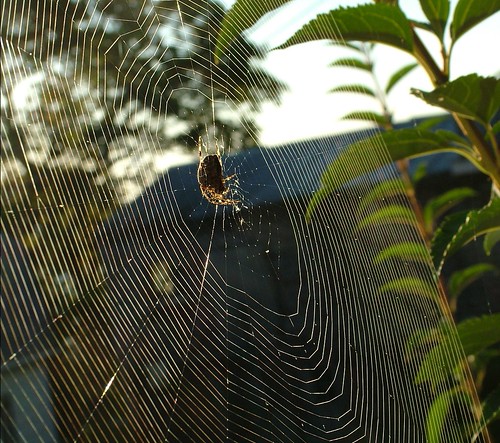Realizing that this blog is just way to heavy, I've decided to take a momentary shot at levity and humor.
I swear this is a true story. Only the names have been changed to protect the innocent (specifically, me, from getting sued). This is one of those things that I can't really find literary inspiration in because if I actually put it in a work of fiction, it would stretch the willful suspension of disbelief too far.
I met Steph her freshman year in college (this was back before schools started calling them "first year students" to give the appearance of increased gender equity without having to make any real change. My response to this was to start calling them "persons of fresh" because "first year student" is just ugly and awkward). I was a much more worldly second year freshman, my first year of college not having gone so well. I was co-editor of a literary magazine called
Unbridled Lust! to which Steph had submitted poetry to. I told her I liked her work and she followed me around for days after that.
I have a frustrating blind spot. While I normally consider myself an astute observer of humans, I have absolutely no idea what people think of me most of the time. It is only with that 20/20 hindsight that I say, oh, Goddammit! I could have gotten laid! That hindsight usually only comes years after the fact also, when it is far too late to do anything useful with the information and I can only frustratedly ponder what the experience might have been like. So when a friend told me, "Dude, Steph is totally into you. You should totally go for it," I thought he was totally crazy because Steph was clearly interested in the magazine, not me. Steph got bored with my inaction and moved on before I realized my friend was right.
Years later, I realized Steph wasn't interested in the magazine at all. At that point, though, it had been a couple years since I'd last seen or even thought of her. Then I couldn't help but be reminded of her because she was all over the news. She'd been shot! She was walking out in the woods and got too close to a shooting range and got shot in the chest. Had the bullet gone half an inch further it would have hit her heart. Like a Reader's Digest
Drama in Real Life, she walked back to civilzation on her own and survived.
A little known fact: women who survive gunshot wounds to the chest are sexy.
Suddenly I remembered Steph and realized that she really had wanted, um, involvement those years back. And then I
accidentally ran across her on campus after she'd gotten out of the hospital. The bullet was still inside her! It was safer to leave it where it was, for some reason, than to cut it out. Which just made her all the sexier. She had a boyfriend, though. At this period in my life I cared about such boundaries, so I was left wondering, again...
Years later I was writing computer books and had an office in Portland's beautiful scenic Old Port area. This was before I realized just how much writing computer books sucked, so at the time I felt like a rising star. This book was going to make a ton of money and establish my reputation in the field and better and more lucrative books would follow. It didn't quite work out that way, though, but at the time I didn't know that. All I knew was that I was a Writer (the capital meaning I was actually getting paid for it). And I'm strutting down the street, going to get a double cappucino at Arabica and who do I run into but Steph? She's just moved to Portland. I invited her out to dinner on the spot.
She showed up to dinner with her boyfriend, Phil, which was a bit of a dissapointment. She also had her sister, uh, Becky, in tow. Her sister didn't have a boyfriend. She did, however, have blond hair and big breasts and while I'm usually not such a "typical male" (I hope) well, I sometimes I just can't help myself. If I couldn't have sex with Steph, at least I could vicariously have it with her sister.
Stupid, stupid, stupid. One of the worst mistakes I've ever made. Worst. Relationship. Ever. But that is a long and boring story for another day. This story is about Steph.
Even if I wasn't dating her, I was able to acquire some of the caché for that shot-in-the-chest thing amongst my drinking buddies. Steph loved the attention that getting shot got her, so if I brought her out drinking with us, I knew I could get her to pull down her shirt and show off her scar. The bullet had gone in right between her breasts, way down, so showing it off meant giving a discreet peep-show as well. This wonderful combo of sex and violence always won props from my friends.
A few months into my relationship with Becky, Steph went crazy. Now, I've had my own share of extreme existential crises, so I'm really not one to be making fun of others for having them, but Steph, well, I just can't help it.
Steph started questioning her sexuality. Most people do. It can be a very healthy thing. What most people
don't do is go through such extreme lengths to make sure everyone knows it. The crux of of it was something like this: "I think I'm a lesbian,
but I still love Phil..." Okay, so you think you're a lesbian. Try dating women and see if you like it. Your friends and family have made it clear to you that they'll love you and be there for you no matter what, so there's no pressure from them, either way. But no. Steph spends day, weeks,
howling. I guess she was crying, but the sound she made... My friend Mark used to have a dog who you could get to make a noise that sounded something like, "I love you," by howling "I love you," at it. That's what Steph sounded like. That noise we made trying to get the dog to say human words.
At first it was tragic and we all felt very sympathetic to Steph in her hour of need. But it just went on for so long. Becky and I would be hiding in her room pretending to have sex so that we wouldn't have to listen to Steph repeat her mantra of "I think I'm a lesbian but I love Phil" over and over. Steph could spend endless hours explaining this to you, but it all came down to finding new ways of saying the same sentance over and over. Sometimes Becky would give me money so I could take Steph out to lunch and a movie so she wouldn't have to deal with her for a while. And when we were out, invariably someone (didn't matter if it was friend, acquantance or stranger) would say, "Hey, how ya doin?" to which Steph would respond, "Well... not so good... I think I'm a lesbian, but I still love my boyfriend Phil..."
FINALLY Steph decided to do something besides cry. She broke up with Phil so she could be free to explore her new lesbianism. Something she did by sleeping with a whole bunch of random guys. Once she called home to announce she wasn't coming home for a while. She was going to Graceland with Donnie Posiedon, some guy she just met.
Then one day she announced she was all better. She'd had sex with a woman and decided she wasn't really a lesbian after all.
Come to find out, she'd actually taken part in a three-way with her housemate's boss and his girlfriend. When I told this to my friend Michel, a "real" lesbian, her reaction was, "She what? After a three-way? That's like deciding you're not a lesbian after watching an episode of
Ellen!"
Last I knew Steph and Phil were still together. Though there was a lot of tension about that 3-way thing. That had been one of his long-time fantasies, and then she went and had one with someone else. Not sure if he knew about Donnie Posiedon though. That would have burned me more than the 3-way. But then, going to Graceland has been my long-time fantasy, so if a girlfriend broke up with me and went there with someone else, well... I guess it would be worse if she went to Legoland with him, though...
Okay, well I guess that's not the funniest thing in the world and maybe I should stick with dark and depressing. Guess you'd have to have been there...



